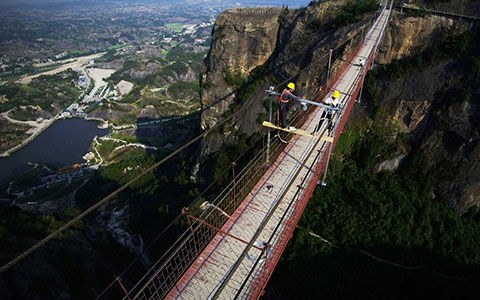China urges DPRK to do more for peninsula's peace
Updated: 2015-09-15 21:53
(Xinhua)
|
||||||||
BEIJING - China on Tuesday urged the Democratic People's Republic of Korea (DPRK) to safeguard stability in the Korean Peninsula following reports that the country had restarted its nuclear program.
"We hope that under the current circumstances, the party concerned will do more that helps safeguard peace and stability of the peninsula and the region," said Foreign Ministry spokesperson Hong Lei at a daily press briefing.
The DPRK on Tuesday said that its main nuclear complex was operating and it was working to improve the "quality and quantity" of its weapons.
Hong said China had always pushed for the denuclearization of the Korean Peninsula and had supported its peace and stability.
"China's position on the Korean Peninsula nuclear issue is consistence and clear. We call for dialogue and negotiation to solve it," he said.
On Monday, Pyongyang said it was in the final stage of developing new satellites for earth observation, ready for the 70th anniversary of the founding of the Workers' Party of Korea, fueling speculation that this is a cover story for deployment of long-range rockets or ballistic missiles.
Hong said that as a sovereign country, the DPRK has the right to peacefully explore the outer space, but its activities are still subject to restrictions outlined by UN Security Council resolutions, which "should be abided by earnestly."
"China hopes that the party concerned will act prudently and avoid any actions that may cause the escalation of the tensions in the peninsula and the region," Hong said.
On the upcoming 10th anniversary of the Sept 19, 2005 joint statement this weekend, an international seminar will be held in Beijing to commemorate the statement.
As the chair of the six-party talks on the Korean Peninsula nuclear issue, China holds the seminar to "call on all relevant parties to continue to stick to the goals and principles outlined in the statement, so as to put the Korean Peninsula nuclear issue again into a process of dialogue and negotiations and resume the talks," Hong said.
Launched in 2003, the six-party talks bring together China, Japan, Russia, the Republic of Korea, the United States and the DPRK to negotiate the Korean Peninsula nuclear issue.
On Sept 19, 2005, the six parties wrapped up their fourth round of talks with a joint statement, widely considered the most important agreement ever achieved so far in undertaking.
The document affirmed the aim that the region will be denuclearized, in a peaceful manner. The DPRK committed to abandoning all nuclear weapons and existing nuclear programs but insisted on its right to peaceful uses of nuclear energy.
The talks were suspended in December 2008. The DPRK walked out of the talks in April 2009 in protest against UN sanctions.
- Australia launches first air strikes against IS
- King promises to find cause of crane tragedy
- Austria plans border checks as thousands refugees backlogged
- Britain marks 75th anniversary of victory in Battle of Britain
- EU ministers to hold new migration crisis meeting
- China treads peaceful path after DPRK nuclear move

 Man tries to sell kidney for iPhone 6s
Man tries to sell kidney for iPhone 6s
 Gems of Chinese painting at Sotheby's HK auction
Gems of Chinese painting at Sotheby's HK auction
 NYFW: Tommy Hilfiger Spring/Summer 2016 collection
NYFW: Tommy Hilfiger Spring/Summer 2016 collection
 Bus decorated with 3D painting goes into service
Bus decorated with 3D painting goes into service
 Top 10 tire companies in the world
Top 10 tire companies in the world Djokovic beats Federer to win second US Open title
Djokovic beats Federer to win second US Open title
 The world in photos: Sept 7-13
The world in photos: Sept 7-13
 Hanging in the air: Workers risk life on a suspension bridge
Hanging in the air: Workers risk life on a suspension bridge
Most Viewed
Editor's Picks

|

|

|

|

|

|
Today's Top News
2015 US-China Climate Leaders Summit kicks off
Bold steps on climate to be unveiled
Parade attendees tell Houston of honor
Boeing plan for finishing center to stir up China market
Illegal margin debts probe won't crash markets: CSRC
Kissinger anticipates promising China-US ties
Germany re-imposes border controls to slow migrant arrivals
Thousands flee California wildfire as homes go up in flames
US Weekly

|

|








